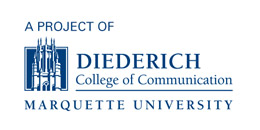
The city’s battle with syphilis continues, and the Keenan Health Center is still a crucial location for treatment services. (NNS file photo by Ana Martinez-Ortiz)
Milwaukee saw its highest syphilis case total in two decades in 2021, more than doubling rates from 2020.
The city recorded 441 cases of primary and secondary syphilis, according to preliminary data from the Milwaukee Health Department. This comes after Milwaukee recorded 183 cases in 2020.
The data is subject to change as there are still some cases being tracked. Dr. Heather Paradis, chief medical officer of the Milwaukee Health Department, said the full year- end report is expected to be released in May. She did not anticipate that the case total would change drastically.
“These are accurate numbers and reflections of what we’re seeing,” Paradis said. “And in talking with our clinical partners across the city that deal with STD services, they are feeling these numbers as well.”
Syphilis is a sexually transmitted infection. The earlier stages of the disease, primary and secondary syphilis, are the most common and can result in a number of symptoms, including genital sores, unexplained rashes, swollen lymph nodes and fever.
If left untreated, the disease can result in tertiary syphilis, an advanced stage of the disease that can affect organ systems like the heart, blood vessels, brain and nervous system, although these cases are rare.
From 2001 to 2019, the county did not have a year with syphilis cases in the triple digits, according to data from the health department’s SurvNet, a set of disease statistics for Milwaukee County.
The recent spike has especially affected women of child-bearing age, according to the Wisconsin Department of Health Services. Historically, men who have sex with men have been primarily affected by syphilis.
The spike for women of child-bearing age has resulted in an increase in cases of congenital syphilis, a condition in which newborn babies contract the disease at birth. These numbers are also rising in Milwaukee County. Congenital syphilis can have permanent health effects on a child and may result in loss of life.
Paradis said the health department investigated 19 cases of congenital syphilis in 2021, a staggering increase from prior years when only one or two cases would occur annually. This number is also preliminary and subject to change after further investigation, she said.
Melissa Ugland, a public health consultant, said the numbers were discouraging. Reaching out to at-risk populations and getting them tested and educated was critical, she said.
“From a prevention standpoint, like any other disease under the sun, the earlier you catch it the better,” Ugland said.
Paradis said the department is planning more community outreach for this year, including going to heavily affected areas and reaching health care workers about how to detect and diagnose syphilis.
Racial disparities abound
According to a report from the Milwaukee Health Department, roughly 66% of the city’s syphilis cases from 2018 to 2020 were among Black residents, as opposed to 15% for the white and Latinx populations. Data on other racial and ethnic groups was not included. There was no racial and ethnic breakdown available for the preliminary 2021 data.
Why the spike in syphilis cases? A definitive answer is elusive, but the experts point to some probabilities.
Meghan Benson, director of community education for Planned Parenthood of Wisconsin, said the pandemic made access to preventative care more difficult.
Some barriers for accessing sexual health clinics include the location of services, lack of transportation and distrust of health care systems, she said. Part of the difficulty is also getting people to feel comfortable seeking services in the face of stigma.
“People may have feelings of shame or guilt,” Benson said. “We also don’t talk about it much—people don’t have all the information they need.”
Ruthie Burich-Weatherly, president of the Milwaukee Board of Health, said the city needs to ensure adequate staff and funding for the health department to put up prevention efforts, increase education and awareness around the issue and continue doing outreach.
“We want to avoid, essentially, a syphilis epidemic in a pandemic,” Burich-Weatherly said.
Where to find help
Syphilis briefs from the Department of Health Services are available in English, Spanish and Hmong on its website.
Free or low-cost testing is available at local health centers, such as Sixteenth Street Community Health Centers and Milwaukee Health Services.
The Milwaukee Health Department maintains a list of places to get tested in the area.
To contact the Milwaukee Health Department’s Keenan Health Center, call 414-286-8840. It is located at 3200 N. 36th St.
BESTD Clinic, 1240 E. Brady St., offers syphilis testing. Call 414-272-2144.
Holton Street Clinic, 3521 N. Holton St., provides free syphilis and HIV screening. Call 414-264-8800.
To contact Planned Parenthood and make an appointment, call 844-493-1052 or visit its website and select “Book Online.” Planned Parenthood has multiple locations throughout the city. You can find health centers near you at this link.
In case you missed it: Milwaukee sees rise in syphilis cases






Leave a Reply